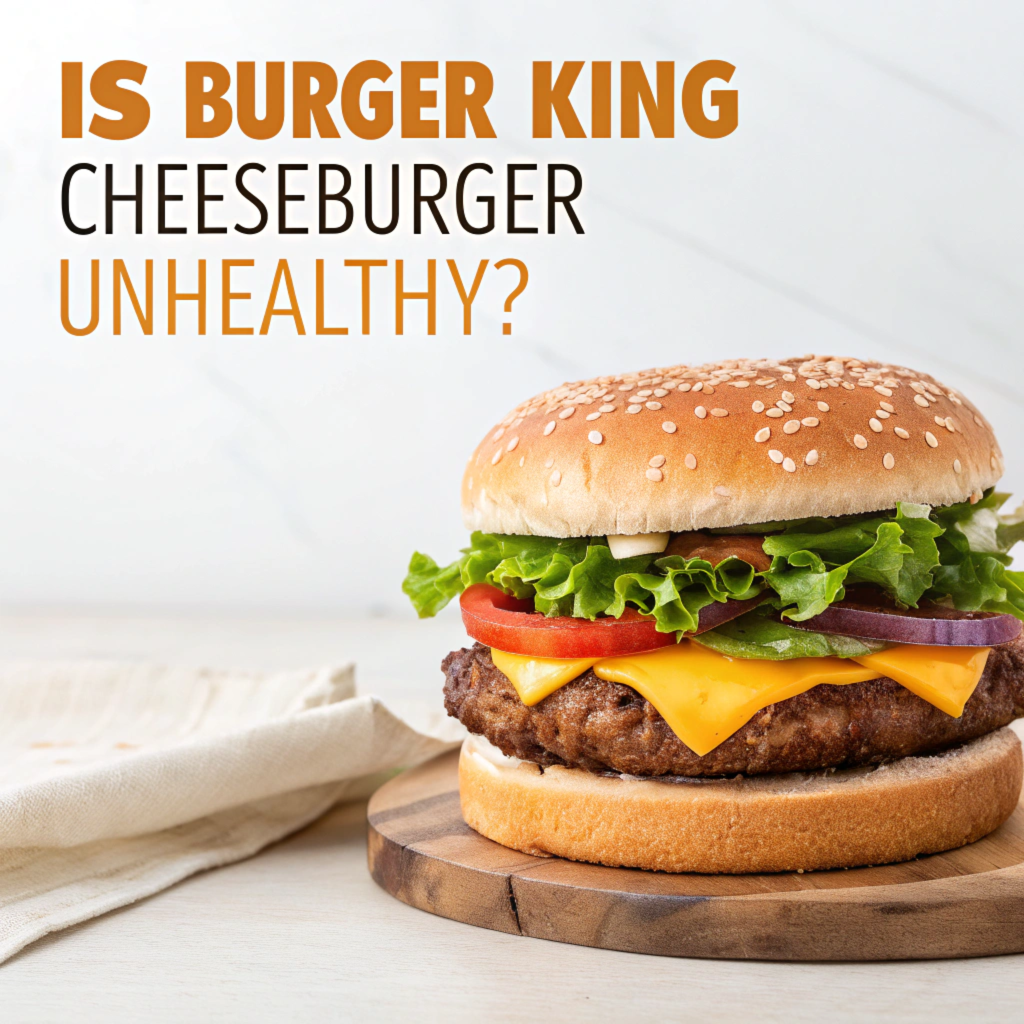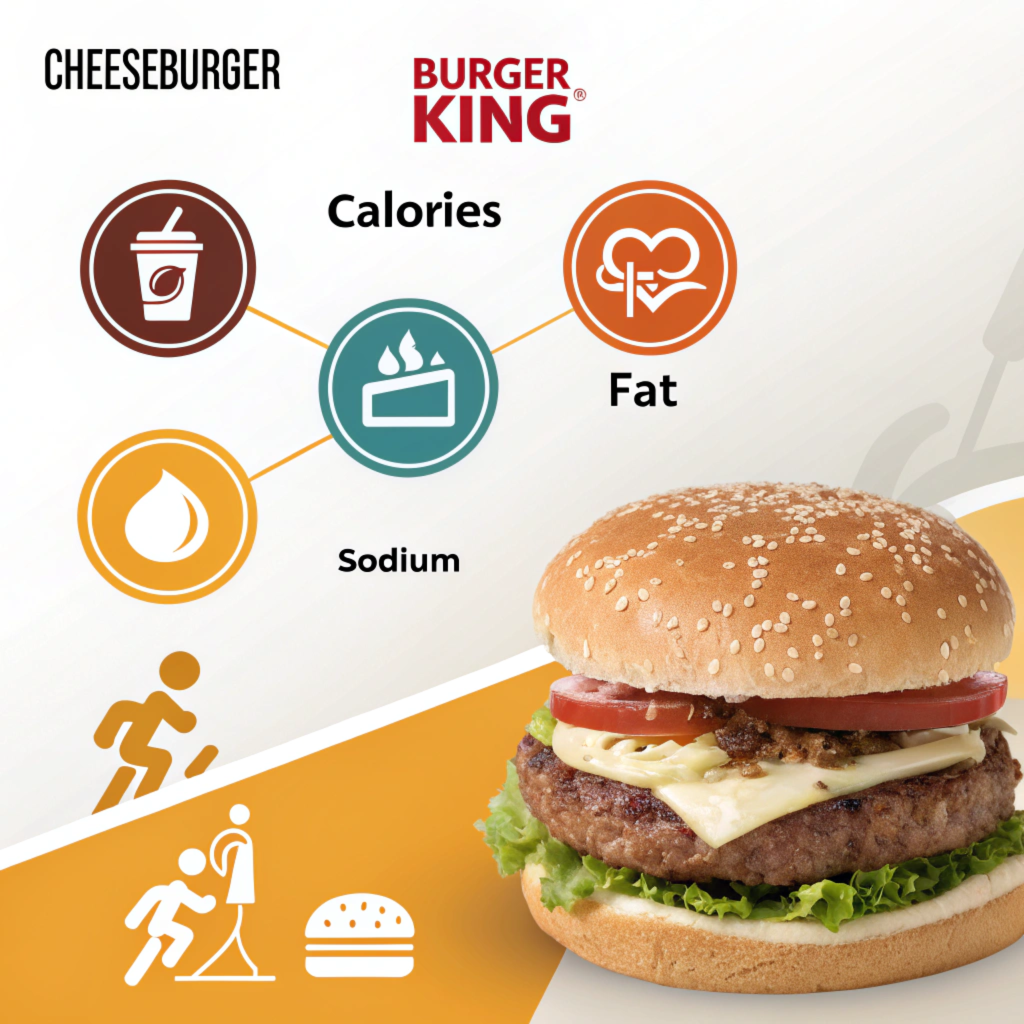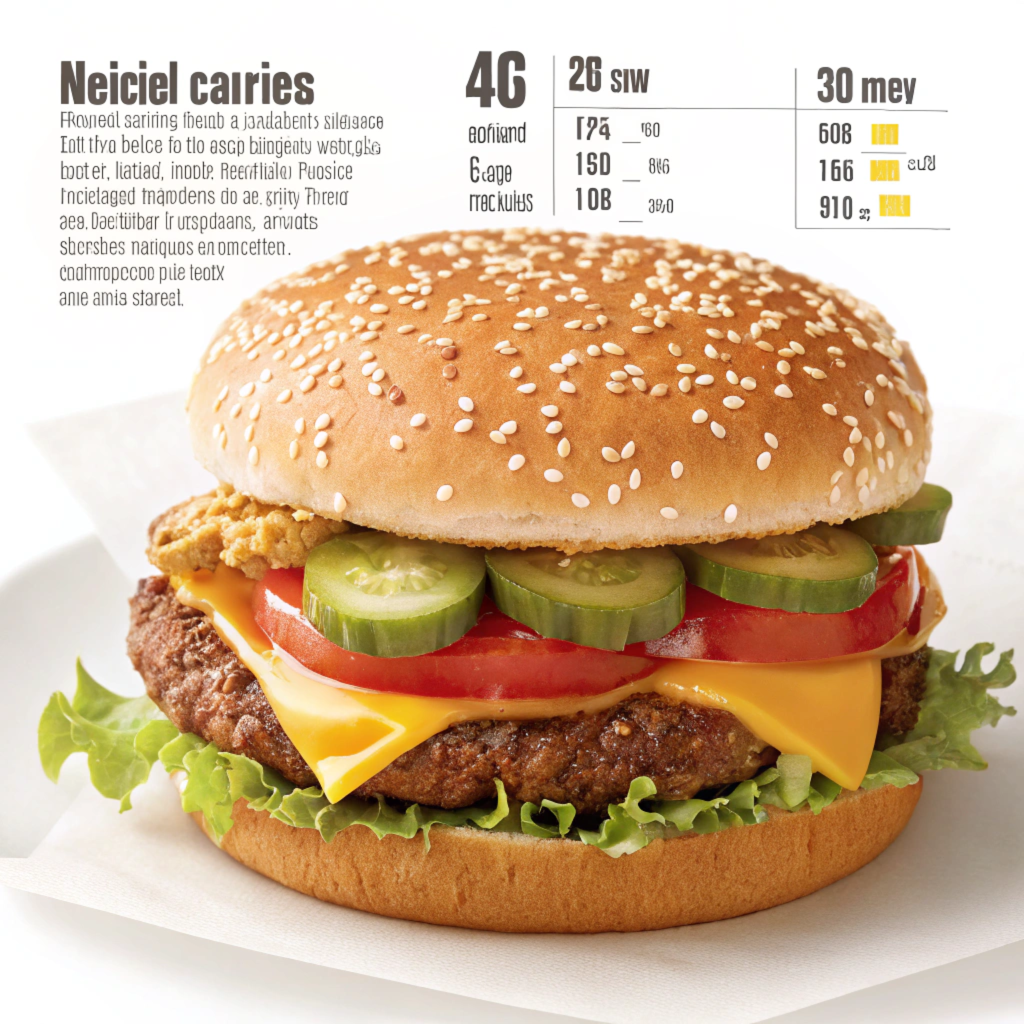
Burger King Cheeseburger Healthiness is a popular fast-food choice, but many wonder if it’s healthy. With a mix of flavorful ingredients, it offers protein, carbs, and fats. However, its nutritional profile raises concerns. This article breaks down its contents, health risks, and tips for making healthier choices.
Understanding Fast-Food Nutrition
Fast food is convenient but often lacks balanced nutrition. Burger King’s cheeseburger includes a beef patty, cheese, and toppings like ketchup and pickles. These ingredients provide protein, calcium, and iron. However, they also add sodium, saturated fats, and sugars. This combination can be unhealthy if eaten frequently.
Eating fast food occasionally is unlikely to harm your health. Problems arise when it becomes a regular habit. Being aware of portion sizes and ingredient content is essential. Knowing what’s in your meal can help maintain a balanced diet.
Why People Question Its Healthiness
The cheeseburger contains about 300-350 calories, making it a moderate meal. It provides protein and essential nutrients like iron and calcium. However, it also has around 680 mg of sodium and 14-18 grams of fat. These amounts can be high if you’re watching your intake.
Sugars from ketchup and the bun also add up, contributing about 7 grams. This amount isn’t excessive but can impact your daily sugar limit if paired with sweet drinks or desserts. People concerned about heart health, cholesterol, or blood pressure may need to monitor these elements closely.
Balancing Convenience with Nutrition
Despite its drawbacks, the cheeseburger can fit into a balanced diet when eaten occasionally. Pairing it with healthier sides like a salad or fruit can offset its calorie count. Skipping fries or sugary drinks also helps reduce the meal’s overall impact.
Customizations make the burger healthier. Removing high-calorie sauces like mayo or choosing a lettuce wrap instead of a bun lowers carbs and fats. Adding fresh veggies like tomatoes, onions, or lettuce boosts fiber and vitamins.
Nutritional Breakdown of a Burger King Cheeseburger
Understanding the nutritional content of a Burger King cheeseburger helps determine its place in a balanced diet. This popular menu item contains essential nutrients like protein and calcium but also includes higher amounts of sodium, fats, and sugars. Here’s a closer look at its nutritional profile and how it impacts your daily intake.
Calorie Content
A standard Burger King cheeseburger has about 300-350 calories. The calorie count can vary based on added toppings and sauces. The beef patty and cheese provide most of the calories due to their protein and fat content. The bun and condiments contribute additional calories from carbohydrates and sugars.
While 300 calories might seem moderate, adding fries and a sugary drink can quickly raise the total to over 1,000 calories. For those watching their calorie intake, skipping extras is a simple way to keep the meal lighter.
Macronutrients
A Burger King cheeseburger offers a balanced mix of macronutrients:
- Protein: Around 15-20 grams, mainly from the beef patty and cheese. This amount supports muscle repair and energy.
- Fat: Contains 14-18 grams of fat, including about 6-8 grams of saturated fat. While some fat is essential, too much saturated fat can increase cholesterol levels.
- Carbohydrates: Provides about 30 grams of carbs, mostly from the bun and sauces. These carbs supply quick energy but can raise blood sugar levels.
Balancing these macronutrients with fiber-rich sides like vegetables can make the meal more nutritious.
Sodium and Cholesterol
The cheeseburger contains about 680 mg of sodium, roughly 30% of the recommended daily limit for most adults. Excessive sodium can increase the risk of high blood pressure. Reducing sodium intake elsewhere in the day can help offset this amount.
The burger also has about 40 mg of cholesterol, mainly from the beef and cheese. Those managing heart health should monitor these levels carefully. of Burger King Cheeseburger Healthiness
Sugars and Fiber
With about 7 grams of sugar, the cheeseburger’s sweetness comes from ketchup and the bun. This amount is relatively low compared to sugary drinks or desserts. However, adding sugary sauces or pairing the burger with soda can raise sugar levels significantly.
The burger contains minimal fiber, making it less filling on its own. Adding a side salad or veggies can increase fiber and improve satiety.
Balancing the Meal
Eating a Burger King Cheeseburger Healthiness occasionally can fit into a balanced diet if paired with healthier sides and beverages. Consider water, unsweetened tea, or sparkling water instead of soda. Opt for a small side salad or apple slices to boost fiber and vitamins.
Next, we’ll explore the potential health risks associated with regular cheeseburger consumption.
Why a Burger King Cheeseburger Can Be Unhealthy
While a Burger King cheeseburger offers a satisfying meal with essential nutrients like protein and calcium, its overall health impact depends on its ingredients and preparation. Key concerns include high sodium, saturated fats, and added sugars. Consuming the cheeseburger regularly or in large portions may pose health risks. Let’s explore these concerns in detail.
High Sodium Levels
The cheeseburger contains about 680 mg of sodium, nearly 30% of the recommended daily limit of 2,300 mg. Excess sodium can lead to water retention and increased blood pressure. For individuals managing heart health or hypertension, this level of sodium may be problematic.
Reducing sodium intake throughout the rest of the day can help balance the meal’s salt content. Choosing water or unsweetened beverages instead of salty sides like fries is another way to cut down on sodium.

Excess Saturated Fats
A Burger King Cheeseburger Healthiness contains approximately 14-18 grams of fat, including 6-8 grams of saturated fat. Diets high in saturated fats can increase cholesterol levels, raising the risk of heart disease. The American Heart Association recommends limiting saturated fat intake to less than 13 grams per day.
For a healthier option, consider removing the cheese or choosing a protein alternative like a grilled chicken patty. Skipping high-fat condiments such as mayonnaise can also help.
Caloric Density and Portion Control
The cheeseburger alone has about 300-350 calories, which is manageable in a balanced diet. However, adding fries, sugary drinks, or desserts can increase the meal’s calorie count to over 1,000 calories. Eating this regularly without balancing calories can contribute to weight gain.
Portion control is key. Ordering a small burger and pairing it with water or a side salad can create a more balanced meal. Skipping extras like bacon and double patties also reduces calories.
Added Sugars in Sauces
The burger contains about 7 grams of sugar, mainly from ketchup and the bun. While this amount is moderate, consuming sugary beverages or additional sauces can raise sugar intake significantly.
Choosing sugar-free drinks or skipping ketchup can reduce added sugar consumption. This is particularly important for individuals managing blood sugar levels or reducing overall sugar intake.
Minimal Fiber Content
The cheeseburger provides little fiber, making it less filling and potentially leading to hunger soon after eating. Fiber is essential for digestion, weight management, and heart health.
Adding fiber-rich sides like a small salad or apple slices can improve the meal’s nutritional balance. Opting for a whole-grain bun when available also boosts fiber intake.
Balancing Health Risks
While a Burger King Cheeseburger Healthiness can be unhealthy when consumed frequently, occasional indulgence is manageable. Balancing the meal with nutrient-dense sides and limiting high-calorie additions can minimize health risks.
Healthier Customization Options
A Burger King Cheeseburger Healthiness can be made healthier through simple customizations. Adjusting toppings, sauces, and sides can reduce calories, fat, and sodium while boosting nutrients. Here are effective ways to make this popular fast-food item more nutritious.
Modify Toppings and Sauces
Toppings and sauces can add flavor but also extra calories, sugars, and sodium. Making smart swaps helps create a healthier burger.
- Skip Ketchup and Mayo: These sauces add sugars and unhealthy fats. Opt for mustard, which is lower in calories and adds tangy flavor.
- Add Fresh Veggies: Ask for extra lettuce, tomatoes, and onions for more fiber, vitamins, and crunch. Fresh veggies balance the burger’s richness.
- Hold the Pickles: If you’re monitoring sodium intake, skip pickles or ask for fewer slices.
Choose a Better Protein Option
Switching the protein source can significantly change the burger’s nutritional value.
- Grilled Chicken Patty: Substitute the beef patty with a grilled chicken fillet to reduce fat and calories while keeping protein high.
- Plant-Based Alternative: The Impossible Burger provides a plant-based option lower in saturated fats. Be sure to customize toppings to avoid unnecessary calories.
- Smaller Patty: Request a single patty to reduce portion size and calorie count.
Reduce the Bun’s Impact
The bun adds carbs, sugars, and calories. Adjusting this component can help lower the meal’s glycemic impact.
- Lettuce Wrap: Swap the bun for lettuce leaves for a low-carb, keto-friendly option.
- Whole-Wheat Bun: When available, this choice adds fiber and essential nutrients.
- Open-Face Style: Eat only the bottom bun to cut carbs by half while keeping the burger stable.
Limit Extra Sides and Drinks
Sides and drinks often double or triple the calorie count of a meal. Avoiding these extras makes a significant difference.
- Skip the Fries: Replace fries with a side salad, apple slices, or a fruit cup for added vitamins and fiber.
- Choose Water or Unsweetened Tea: Avoid sugary sodas and shakes that add empty calories and sugar spikes.
- Share Portions: If you want fries, split them with a friend to reduce overall calorie intake.
Smart Ordering Tips
- Customize at the Counter: Don’t hesitate to request specific toppings, sauces, and bun choices. Burger King allows full customization.
- Check Nutritional Information: Use Burger King’s website or app to view the nutritional content of each item before ordering.
- Balance the Day’s Meals: If you indulge in a cheeseburger, choose lighter meals for the rest of the day to maintain a balanced diet.
By making these adjustments, a Burger King cheeseburger can fit into a healthier lifestyle.
Health Benefits of Burger King Cheeseburgers (in Moderation)
A Burger King cheeseburger is often considered unhealthy due to its calorie count, fat content, and sodium levels. However, when eaten in moderation and customized wisely, it can provide essential nutrients and fit into a balanced diet. Let’s explore the nutritional benefits that this popular fast-food item can offer.
Source of Protein and Iron
One of the most notable benefits of a Burger King cheeseburger is its protein content. With about 15-20 grams of protein per serving, it supports muscle repair, tissue growth, and overall body function.
- Beef Patty Benefits: Beef is rich in protein and essential minerals like iron and zinc. Iron supports oxygen transport in the blood, helping combat fatigue and promoting energy levels.
- Cheese Contribution: The cheese slice adds additional protein and calcium, aiding in muscle maintenance and bone health.
Tip: Choosing a double cheeseburger can increase protein but also add extra fat and calories. Opt for a single patty and add extra vegetables for more balanced nutrition.
Essential Vitamins and Minerals
Despite its fast-food reputation, the cheeseburger contains several key vitamins and minerals:
- Calcium: The American cheese provides calcium, essential for strong bones and teeth. A single serving covers about 15% of the daily recommended calcium intake.
- Vitamin B12: Beef contains Vitamin B12, which supports brain health and red blood cell formation.
- Zinc: Found in the beef patty, zinc boosts the immune system and promotes wound healing.
- Iron: Iron from the beef supports healthy blood and prevents anemia.
Tip: Pairing the burger with a side of veggies, such as a salad, can enhance vitamin intake while balancing the meal.

Energy-Boosting Carbs
The burger bun provides carbohydrates, the body’s primary energy source. While refined carbs from the white bun may cause quick energy spikes, they can be useful after physical activity when fast energy replenishment is needed.
- Quick Energy Boost: The bun’s carbs can fuel workouts or busy schedules.
- Healthy Swap Option: Choosing a whole-wheat bun adds fiber, slowing digestion and promoting longer-lasting energy.
Tip: If you are reducing carb intake, consider removing the top bun or opting for a lettuce wrap to cut down on refined carbs.
Balanced Meal Potential
When paired with healthier sides and drinks, a Burger King cheeseburger can be part of a well-rounded meal. Here’s how:
- Add Fiber and Vitamins: Order a side salad with vinaigrette for added fiber and nutrients.
- Choose Healthy Beverages: Water or unsweetened iced tea keeps sugar intake low while promoting hydration.
- Skip High-Calorie Extras: Avoid fries, sugary sodas, and high-fat sauces to maintain a balanced meal.
Tip: Adding extra veggies like tomatoes, lettuce, and onions boosts the burger’s nutritional profile while keeping the calorie count moderate.